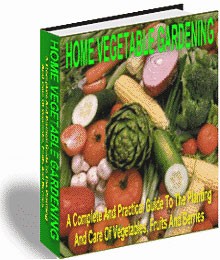 License Type: Resell Rights
License Type: Resell Rights  File Size: 1,232 KB
File Size: 1,232 KB File Type: ZIP
File Type: ZIP
 SKU: 16972
SKU: 16972  Shipping: Online Download
Shipping: Online Download
Ebook Sample Content Preview:
Having considered, as thoroughly as the limited space available permitted, the matter of plant foods, we must proceed to the equally important one of how properly to set the table, on or rather in, which they must be placed, before the plants can use them.
As was noted in the first part of the preceding chapter, most tillable soils contain the necessary plant food elements to a considerable extent, but only in a very limited degree in available forms. They are locked up in the soil larder, and only after undergoing physical and chemical changes may be taken up by the feeding roots of plants. They are unlocked only by the disintegration and decomposition of the soil particles, under the influence of cultivation--or mechanical breaking up--and the access of water, air and heat.
The great importance of the part the soil must play in every garden operation is therefore readily seen. In the first place, it is required to furnish all the plant food elements--some seven in number, beside the three, nitrogen, phosphoric acid and potassium, already mentioned. In the second, it must hold the moisture in which these foods must be either dissolved or suspended before plant roots can take them up.
The soil is naturally classified in two ways: first, as to the amount of plant food contained; second, as to its mechanical condition--the relative proportions of sand, decomposed stone and clay, of which it is made up, and also the degree to which it has been broken up by cultivation.
The approximate amount of available plant food already contained in the soil can be determined satisfactorily only by experiment. As before stated, however, almost without exception they will need liberal manuring to produce good garden crops. I shall therefore not go further into the first classification of soils mentioned.
Of soils, according to their variation in mechanical texture, I shall mention only the three which the home gardener is likely to encounter. Rocks are the original basis of all soils, and according to the degree of fineness to which they have been reduced, through centuries of decomposition by air, moisture and frost, they are known as gravelly, sandy or clayey soils.
CLAY SOILS are stiff, wet, heavy and usually "cold." For garden purposes, until properly transformed, they hold too much water, are difficult to handle, and are "late." But even if there be no choice but a clay soil for the home garden, the gardener need not be discouraged. By proper treatment it may be brought into excellent condition for growing vegetables, and will produce some sorts, such as celery, better than any warm, light, "garden" soil. The first thing to do with the clay soil garden, is to have it thoroughly drained. For the small amount of ground usually required for a home garden, this will entail no great expense. Under ordinary conditions, a half-acre garden could be under-drained for from $25 to $50--probably nearer the first figure.
The drains--round drain tile, with collars--should be placed at least three feet deep, and if they can be put four, it will be much better. The lines should be, for the former depth, twenty to thirty feet apart, according to character of the soil; if four feet deep, they will accomplish just as much if put thirty to fifty feet apart--so it pays to put them in deep. For small areas 2-1/2-inch land tile will do. The round style gives the best satisfaction and will prove cheapest in the end. The outlet should of course be at the lowest point of land, and all drains, main and laterals, should fall slightly, but without exception, toward this point. Before undertaking to put in the drains, even on a small area, it will pay well to read some good book on the subject.
- File Size:1,232 KB
- License: Resell Rights
- Category:Ebooks
- Tags:2008 Ebooks Resale Rights








